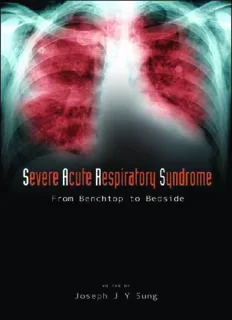
Severe Acute Respiratory Syndrome: From Benchtop to Bedside PDF
Preview Severe Acute Respiratory Syndrome: From Benchtop to Bedside
Severe Rcute Respiratorq Sqndrome From Benchtop t o Bedside This page intentionally left blank Severe Acute Respiratory Syndrome From Benchtop to Bedside edited by Joseph J Y Sung The Chinese University of Hong Kong World Scientific NEW JERSEY (cid:144) LONDON (cid:144) SINGAPORE (cid:144) BEIJING (cid:144) SHANGHAI (cid:144) HONG KONG (cid:144) TAIPEI (cid:144) CHENNAI Published by World Scientific Publishing Co. Pte. Ltd. 5 Toh Tuck Link, Singapore 596224 USA office: 27 Warren Street, Suite 401-402, Hackensack, NJ 07601 UK office: 57 Shelton Street, Covent Garden, London WC2H 9HE British Library Cataloguing-in-Publication Data A catalogue record for this book is available from the British Library. SEVERE ACUTE RESPIRATORY SYNDROME From Benchtop to Bedside Copyright © 2004 by World Scientific Publishing Co. Pte. Ltd. All rights reserved. This book, or parts thereof, may not be reproduced in any form or by any means, electronic or mechanical, including photocopying, recording or any information storage and retrieval system now known or to be invented, without written permission from the Publisher. For photocopying of material in this volume, please pay a copying fee through the Copyright Clearance Center, Inc., 222 Rosewood Drive, Danvers, MA 01923, USA. In this case permission to photocopy is not required from the publisher. ISBN 981-238-753-6 Typeset by Stallion Press E-mail: [email protected] Printed in Singapore. SC - SARS (From Benchtop to ...).pmd 1 10/11/2005, 6:08 PM B222-FM.qxd 09/06/04 10:50 AM Page v Contents Editors and Contributors vii Introduction 1 SARS and Governance in China John WONG and ZHENG Yongnian 1 The Impact of SARS on Greater China Economies 11 John WONG, Sarah CHAN and LIANG Ruobing 2 SARS and China’s Political System 45 ZHENG Yongnian and LYE Liang Fook 3 Local Management of SARS in China: Guangdong and Beijing 77 LAI Hongyi 4 SARS and the Rule of Law in China 99 ZOU Keyuan 5 Healthcare Regime Change and the SARS Outbreak in China 123 GU Xin 6 “Chinese Scientists Were Defeated by SARS” 157 CAO Cong 7 SARS and Freedom of Press: Has the Chinese Government Learnt a Lesson? 181 HE Baogang 8 The Hong Kong SAR Government, Civil Society and SARS 199 Elspeth THOMSON and YOW Cheun Hoe Index 221 v This page intentionally left blank B222-FM.qxd 09/06/04 10:50 AM Page vii Editors John WONG, Research Director, East Asian Institute ZHENG Yongnian, Senior Research Fellow, East Asian Institute Contributors CAO Cong, Research Fellow, East Asian Institute Sarah CHAN, Research Officer, East Asian Institute GU Xin, Professor, Beijing Normal University HE Baogang, Senior Research Fellow, East Asian Institute LAI Hongyi, Research Fellow, East Asian Institute LIANG Ruobing, Research Officer, East Asian Institute LYE Liang Fook, Research Officer, East Asian Institute Elspeth THOMSON, Research Fellow, East Asian Institute YOW Cheun Hoe, Research Officer, East Asian Institute ZOU Keyuan, Senior Research Fellow, East Asian Institute vii This page intentionally left blank B222-Intro.qxd 09/06/04 10:52 AM Page 1 Introduction SARS and Governance in China JOHN WONG AND ZHENG YONGNIAN In the first half of 2003, severe acute respiratory syndrome (SARS) sud- denly struck China and Hong Kong, claiming many lives and causing panic. It also jolted their economic growth, disrupted the social life of their citizens, and created much stress and strain on their political sys- tems and governance. Like dealing with other “external shocks”, the management of the SARS crisis provides a good opportunity to examine the weaknesses and strengths of the political systems of China and its special administrative area, Hong Kong. Although both are Chinese communities, their politi- cal systems differ. China remains an authoritarian political system, despite the dramatic economic transformation that has occurred over the past two decades. Hong Kong inherited the British colonial political sys- tem with a rich tradition of rule of law and an efficient bureaucracy. Nevertheless, after its return to China, societal demands for greater democratization have increased. Given the different political settings of these two Chinese communities, it would be interesting to examine how they responded to the SARS crisis. From the outset, scholars at the East Asian Institute (EAI) have fol- lowed closely the unfolding of SARS events in China and Hong Kong, particularly how each of the two societies has come to grips with such a “random shock”. SARS may or may not recur in the near future, and many of its effects may only be short-term in nature. However, the episode has produced some long-term structural consequences. In 1
